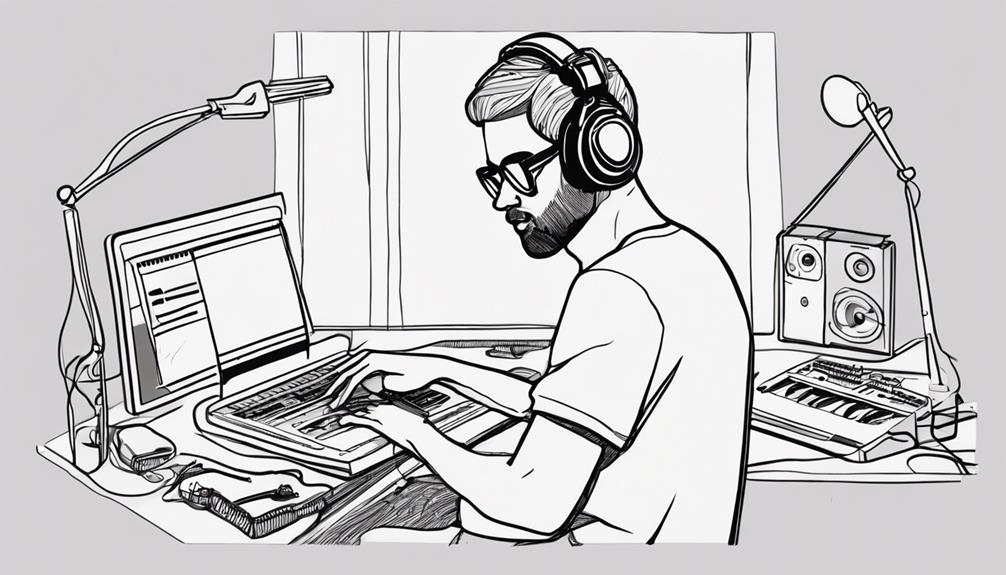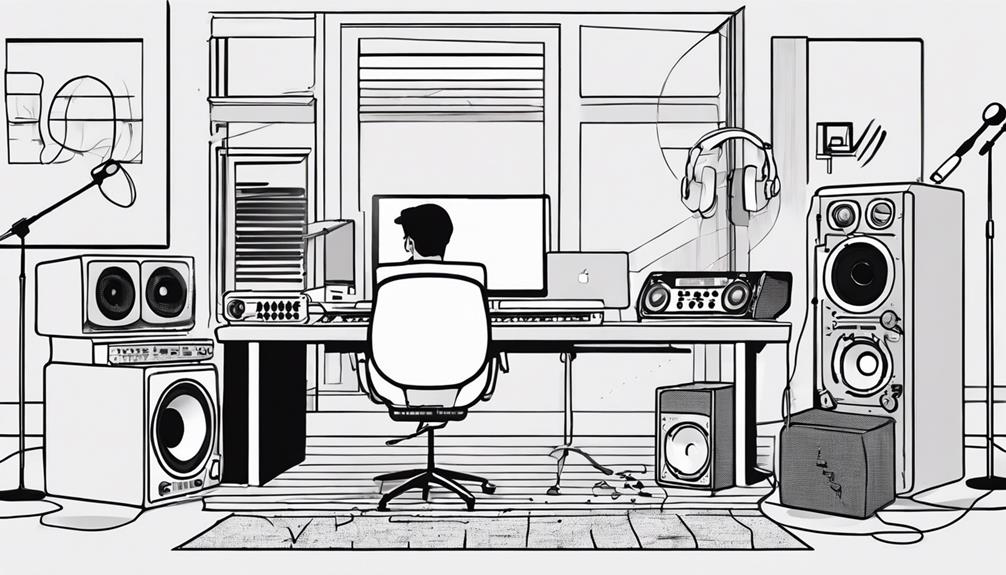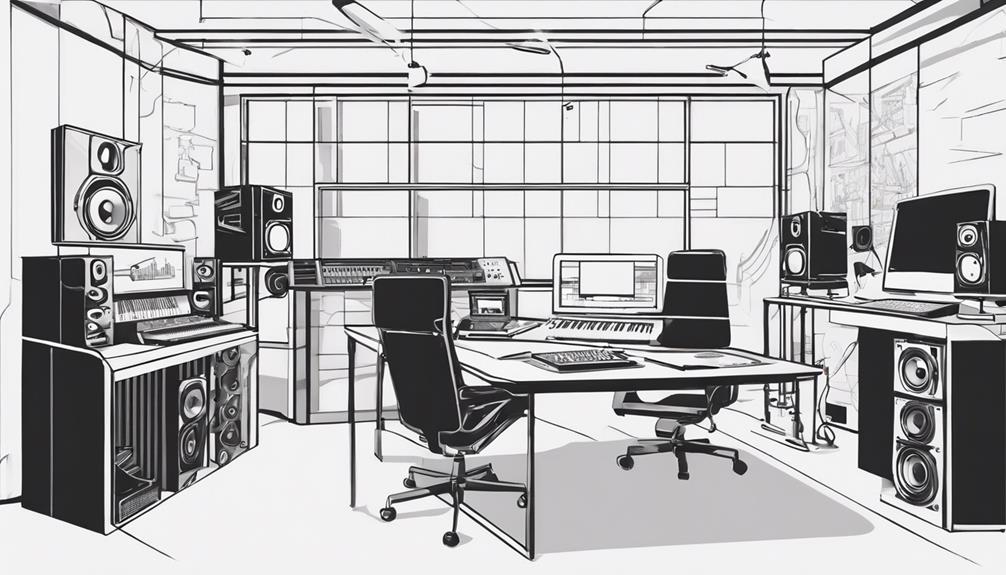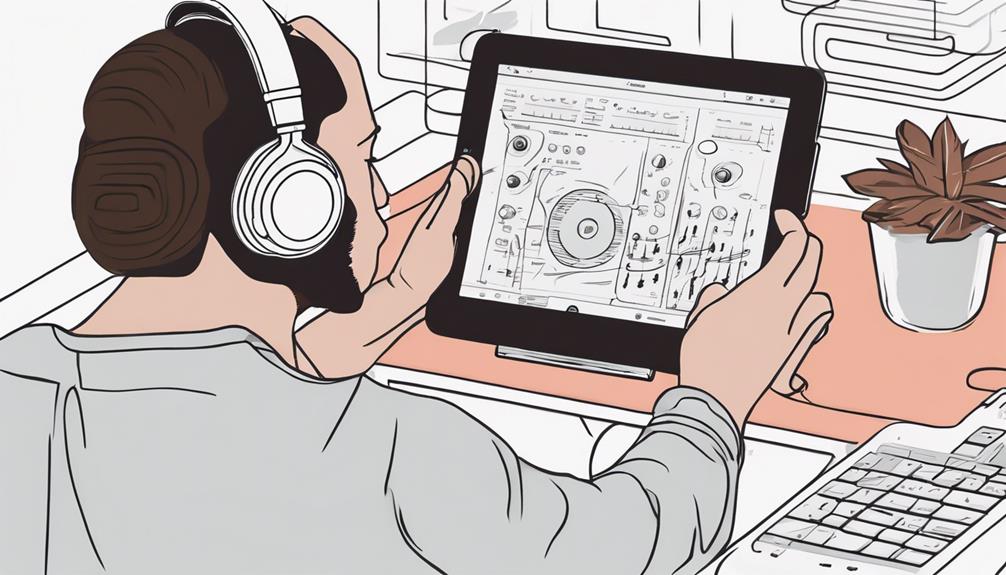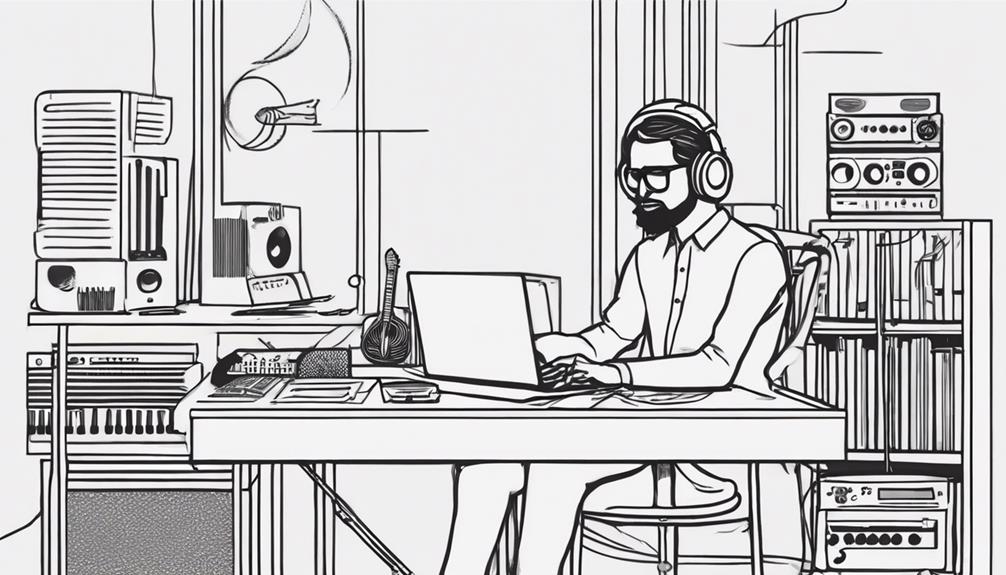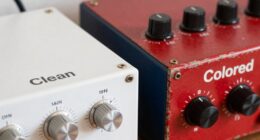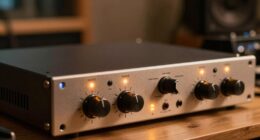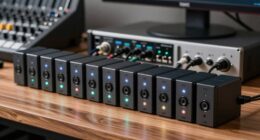Ready to immerse yourself in music production? Start by gathering essential equipment like a computer, audio interface, and studio headphones. Learn the basics: roles of DAW software, microphones, and studio monitors, and production stages from writing to mastering. Collaborate for fresh ideas, networking, and industry exposure. Opt for budget-friendly tools and set up a home studio with proper acoustic treatment. Explore marketing strategies using social media, online streaming, and engaging fans. Dedicate yourself and get creative to kickstart your music production journey today. With dedication and the right tools, you're on your way to creating your own music production success! Remember, consistency and practice are key to honing your skills and building your unique sound. For those focusing on modern genres, explore pop music production tips like layering vocals, experimenting with catchy hooks, and utilizing effects like reverb and delay for polished tracks. Stay open to learning and evolving, as the music industry thrives on creativity and innovation!
Key Takeaways
- Choose a free DAW software to start.
- Invest in a USB microphone and entry-level audio interface.
- Learn basic music production stages like recording and mixing.
- Collaborate with musicians for fresh perspectives.
- Market your music on social media and streaming platforms.
Essential Equipment for Music Production
To set up your music production environment effectively, you must have essential equipment like a computer to power your digital audio workstation (DAW). A computer is the backbone of your studio, allowing you to record and edit music seamlessly.
An audio interface is important for connecting microphones, instruments, and studio monitors to your computer, ensuring high-quality sound recording. Quality studio headphones are a necessity for precise monitoring and audio track editing, enabling you to hear every detail accurately.
Microphones are essential for capturing vocals, instruments, and ambient sounds in your home studio for recording purposes. Additionally, studio monitors (speakers) are essential for accurate playback and mixing of audio tracks, providing a clear representation of sound frequencies.
Learning Music Production Basics
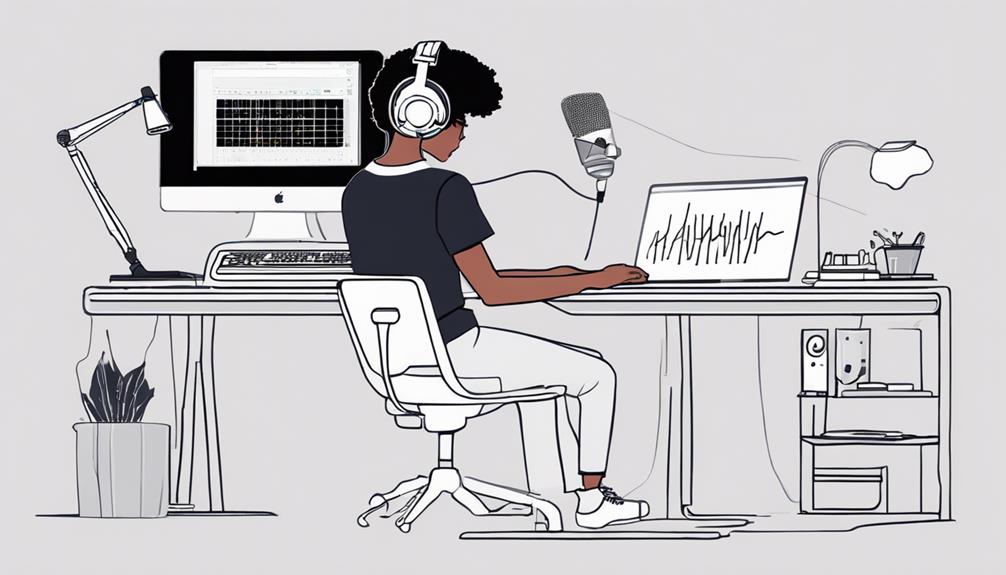
Understanding the fundamentals of music production is essential for anyone aspiring to create their own sound. As a budding music producer, familiarize yourself with the production process, which involves overseeing and guiding artists through various stages.
Essential equipment like DAW software, microphones, and studio monitors play a critical role in achieving high-quality productions. The stages of production include writing, recording, editing, mixing, and mastering.
In the recording stage, learn proper microphone techniques to capture the best sound quality. Utilize MIDI controllers for efficient music creation. During mixing, focus on blending different tracks together seamlessly. Mastering is the final step where you enhance the overall sound and prepare it for distribution.
Collaborating With Musicians and Producers
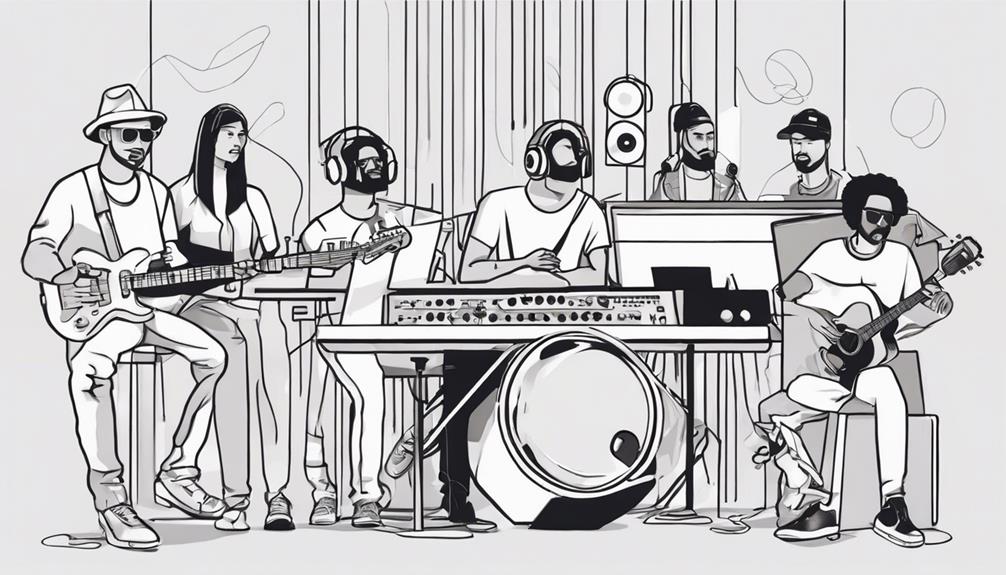
When collaborating with musicians and producers, you'll experience fresh perspectives and ideas that can enhance your music production process.
It's all about networking with the right artists to discover new creative opportunities and expand your skills.
Building strong collaborative relationships is key to nurturing a supportive and enriching environment for your music projects.
Partnering for Creative Synergy
Collaborating with musicians and producers can enhance the creativity and depth of your music production journey. By partnering with others in the industry, you open the door to a world of innovative ideas, unique sound combinations, and creative breakthroughs that can take your music to new heights.
Networking with fellow musicians and producers not only allows for the sharing of resources and experiences but also creates opportunities for collaborative projects that can boost exposure, fan engagement, and industry recognition. Building strong relationships with collaborators fosters a supportive and inspiring environment for continuous growth and success in music production.
Here are some key benefits of partnering for creative synergy:
- Diverse Perspectives: Collaborating brings in different viewpoints and skills, enriching your music production process.
- Innovative Ideas: Partnering can spark fresh and original concepts that push the boundaries of your music.
- Industry Recognition: Collaborative projects can lead to increased visibility and acknowledgment within the music industry.
- Supportive Environment: Strong relationships with collaborators nurture a space for mutual growth and success in music production.
Finding the Right Fit
To create a successful music production, finding the right musicians and producers to collaborate with is crucial for bringing a fresh perspective and enhancing the quality of your work. Networking within the music industry can open doors to exciting collaborations and creative opportunities.
By connecting with talented individuals, you can explore different genres and styles, broadening your musical horizons. Experienced producers can offer valuable insights and help elevate the overall quality of your production.
Building relationships with musicians not only fosters collaborations but also creates important connections within the industry. These connections can lead to future projects and opportunities.
When seeking collaborators, consider individuals whose style and vision align with yours to establish a productive partnership. Embrace the diversity that collaborations bring, as blending different talents can result in truly unique and innovative music productions.
Nurturing Collaborative Relationships
Finding the right fit is just the beginning; nurturing collaborative relationships with musicians and producers is where the magic of music production truly comes alive.
To make the most out of collaborating with musicians and producers, consider the following:
- Networking: Engage with like-minded individuals to explore opportunities for collaborations and projects.
- Building Community: Foster a sense of community and support within the music industry by establishing meaningful connections.
- Sharing Skills: Enhance the quality of music production by sharing skills, knowledge, and resources through collaborations.
- Embracing Diverse Talents: Work with a variety of talents to bring innovative and unique musical creations to life.
Budget-Friendly Music Production Tools
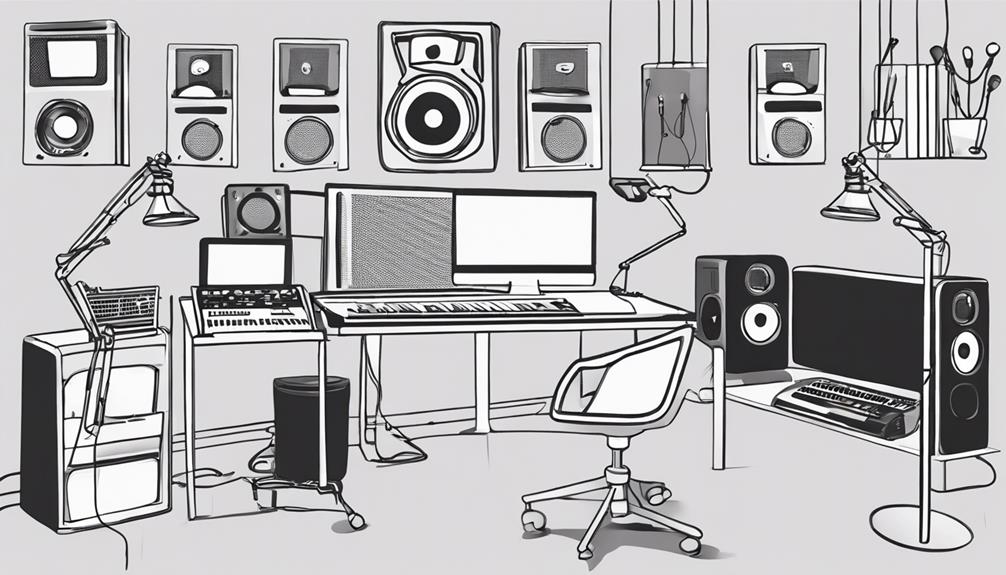
Looking for cost-effective tools to kickstart your music production journey? Consider free DAW software like GarageBand for recording and editing your tracks.
Quality doesn't have to break the bank – affordable USB microphones and entry-level audio interfaces can provide essential connectivity and recording capabilities for your home studio setup.
Don't forget budget-friendly studio headphones and online marketplaces for affordable access to sample libraries and plugins to enhance your music production experience.
Affordable Software Options
For those starting their music production journey on a budget, exploring affordable software options is key to creating your own music production without breaking the bank.
When looking for budget-friendly music production tools, consider the following options:
- Free DAWs: GarageBand and Audacity are excellent choices for those seeking no-cost digital audio workstations.
- Budget-Friendly DAWs: FL Studio and Ableton Live Intro offer advanced features at reasonable prices.
- Online Platforms: Explore BandLab and Soundtrap for free browser-based music production tools accessible from anywhere.
- Affordable Plugins: TAL-Noisemaker and Dexed are cost-effective options for enhancing sound quality without overspending.
Additionally, subscription services like Splice provide access to a wide range of plugins, samples, and presets at affordable rates, making it easier to expand your music production capabilities without breaking the bank.
Essential Hardware Recommendations
Explore budget-friendly hardware recommendations that can elevate your music production setup without breaking the bank. Start with the Focusrite Scarlett 2i2 audio interface for high-quality recording and playback.
Pair it with the Audio-Technica ATH-M50x studio headphones, known for accurate sound reproduction ideal for mixing and monitoring.
For vocals and instruments, consider the versatile Shure SM58 microphone, offering clarity and reliability at an affordable price point.
Enhance your mixing and mastering experience with budget-friendly studio monitors like the JBL LSR305, providing accurate sound representation and a flat frequency response.
To control virtual instruments and software synths, the Akai MPK Mini MIDI controller offers tactile functionality without a hefty price tag.
With these essential tools in your arsenal, you can create professional-quality music without straining your budget.
Setting Up a Home Studio
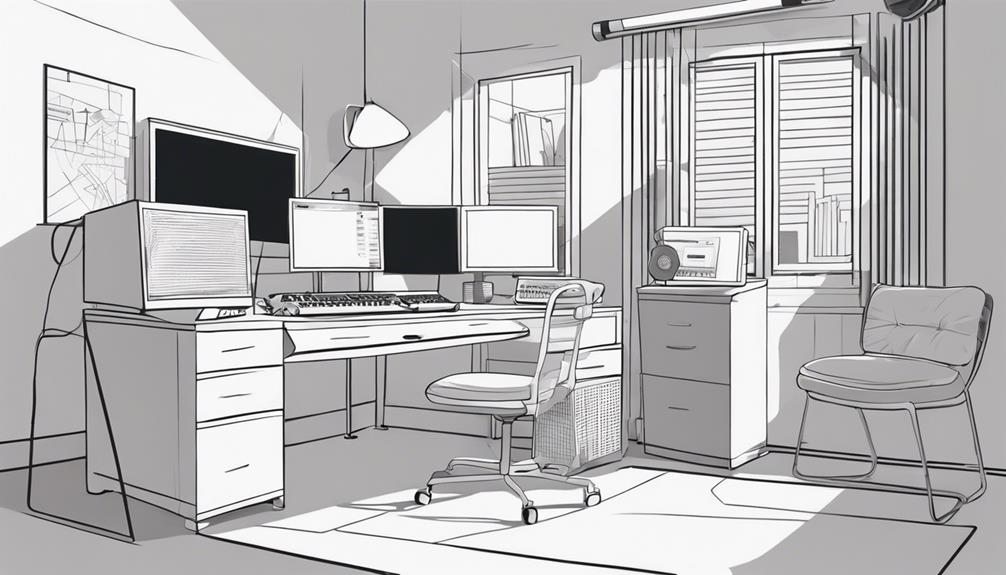
Consider selecting a quiet space with good acoustics when setting up your home studio for music production. This will help guarantee that your recordings have excellent sound quality.
Here are some essential steps to help you set up your home studio effectively:
- Acoustic Considerations: Choose a room with minimal external noise and good natural acoustics to enhance the quality of your recordings.
- Essential Equipment: Invest in key items like a microphone, audio interface, and headphones for your recording setup.
- Acoustic Treatment: Improve sound quality by adding acoustic panels, bass traps, or diffusers to minimize unwanted reflections and echoes.
- Cost-Effective Solutions: Explore DIY options for acoustic treatment and studio furniture to save on expenses and customize your workspace to suit your needs.
Marketing and Distribution Strategies
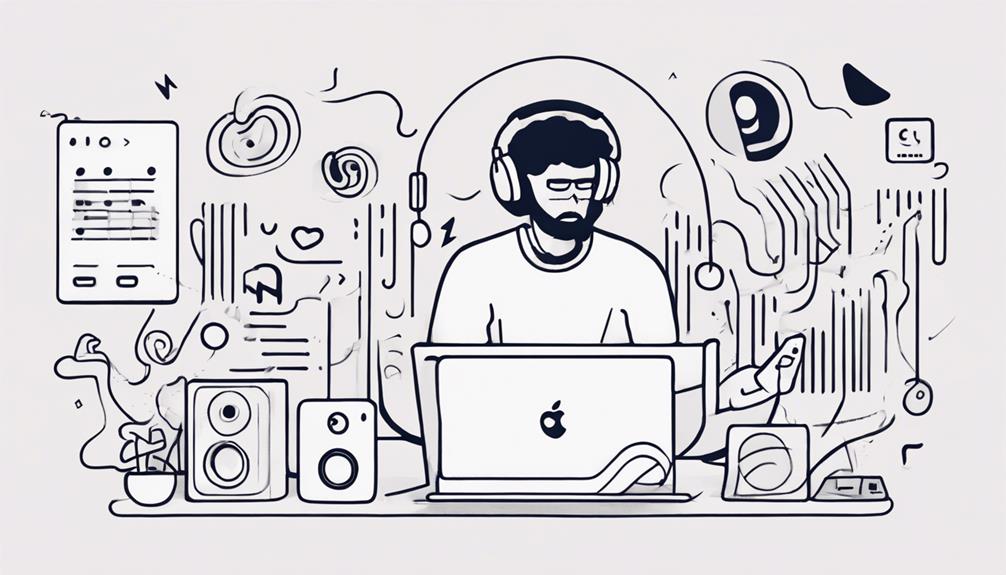
Utilize social media platforms and online streaming services to effectively market and distribute your music to a wider audience. Engage with fans through platforms like Instagram, Facebook, and TikTok to build a loyal following.
Submit your music to online streaming platforms such as Spotify, Apple Music, and SoundCloud to increase visibility and reach. Design visually appealing cover art to attract listeners and make a memorable impression.
Collaborate with music blogs, influencers, and playlists to feature your music and reach new audiences. Use email marketing campaigns and press releases to announce new releases, updates, and upcoming events to keep your fan base engaged.
Frequently Asked Questions
How Do I Start My Own Music Production?
Start by determining your interest in music production. Explore music theory, genres, instruments, composition, and software basics. Develop skills through practice, lessons, collaborations, and live events. Connect with musicians and industry pros. Create a professional portfolio and online presence to establish your career.
Where Do I Start as a Music Producer?
Start by honing your skills in composing, recording, mixing, or mastering. Look for online resources and tutorials to guide you. Connect with fellow musicians and producers for insights. Experiment with software and equipment to grow as a music producer.
Where Do I Start When I Want to Make Music?
Start by choosing your preferred genre and instrument. Learn basic music theory and practice regularly. Collaborate with others and attend live events to grow your skills. Network with industry professionals and create an online presence to start making music today!
How to Produce a Song With No Experience?
To produce a song with no experience, start by experimenting with free software and watching tutorials. Collaborate with others to learn, focus on mastering one aspect at a time, and don't be afraid to make mistakes. Slow progress is still progress!
Conclusion
Now that you have the essential equipment and knowledge to commence your music production journey, don't delay any longer!
Immerse yourself in the world of creating enchanting tunes and collaborating with fellow musicians.
Remember, practice makes perfect, so keep honing your skills and exploring new tools.
With dedication and determination, you can turn your passion for music production into a successful career.
Start today and seize the spotlight!

